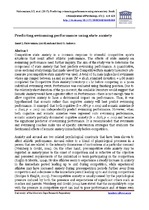| dc.contributor.author | Mabweazara, Smart Z. | |
| dc.contributor.author | Leach, Lloyd | |
| dc.contributor.author | Andrews, Barry S. | |
| dc.date.accessioned | 2017-03-31T08:38:09Z | |
| dc.date.available | 2017-03-31T08:38:09Z | |
| dc.date.issued | 2017 | |
| dc.identifier.citation | Mabweazara, S. Z. et al. (2017). Predicting swimming performance using state anxiety. South African Journal of Psychology, 47(1): 110-120 | en_US |
| dc.identifier.issn | 0081-2463 | |
| dc.identifier.uri | http://hdl.handle.net/10566/2704 | |
| dc.identifier.uri | http://dx.doi.org/10.1177/0081246316645060 | |
| dc.description.abstract | Competitive state anxiety is a common response to stressful competitive sports situations that could affect athletic performance. The effects of state anxiety on swimming performance need further inquiry. The aim of the study was to determine the component of state anxiety that best predicts swimming performance. A quantitative, cross-sectional study design that made use of the Competitive State Anxiety Inventory-2 to measure precompetitive state anxiety was used. A total of 61 male high school swimmers whose age ranged between 14 and 19 years (M = 16.16, standard deviation = 1.66 years) completed the Competitive State Anxiety Inventory-2 1 hr before competing in a 50-m individual swimming event. Performance was evaluated using finishing position. Due to the relatively short duration of the 50-m event, the available literature would suggest that Somatic Anxiety would have a greater effect on Performance - there is not enough time to allow cognitive anxiety to have a detrimental impact on performance. Thus, it was hypothesized that somatic rather than cognitive anxiety will best predict swimming performance. It emerged that both cognitive (b =.787; p <.001) and somatic anxieties (b =.840; p <.001) can independently predict swimming performance. However, when both cognitive and somatic anxieties were regressed onto swimming performance, somatic anxiety partially dominated cognitive anxiety (b =.626; p <.001) and became the significant predictor of swimming performance. It is recommended that swimmers and swimming coaches make use of specific intervention strategies that eradicate the detrimental effects of somatic anxiety immediately before competition. | en_US |
| dc.language.iso | en | en_US |
| dc.publisher | SAGE Publications Inc. | en_US |
| dc.rights | This is the post-print version of the article found online at: http://dx.doi.org/10.1177/0081246316645060 | |
| dc.subject | Competitive state anxiety | en_US |
| dc.subject | Performance | en_US |
| dc.subject | Precompetitive state anxiety | en_US |
| dc.subject | Stress | en_US |
| dc.subject | Swimming | en_US |
| dc.subject | Exercise | en_US |
| dc.title | Predicting swimming performance using state anxiety | en_US |
| dc.type | Article | en_US |
| dc.privacy.showsubmitter | FALSE | |
| dc.status.ispeerreviewed | TRUE | |
| dc.description.accreditation | ISI | en_US |

